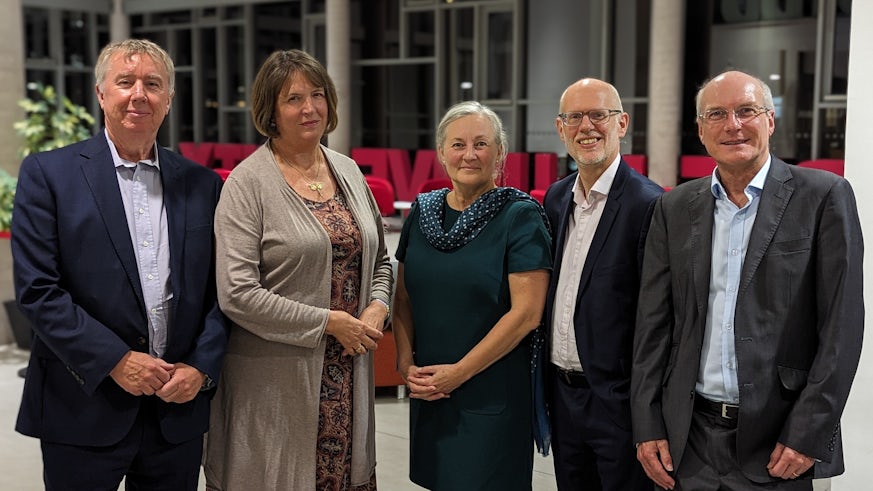Waterloo Foundation Annual Conference focuses on tackling mental ill health
30 October 2023

The Neuroscience and Mental Health Innovation Institute were delighted to host the Waterloo Foundation’s annual meeting with over 120 people in attendance.
The conference, which took place on 12 October at the university’s Hadyn Ellis Building, focused on the topic ‘Mental health: from your inner environment to your outer world’. It featured engaging talks from academic and third sector experts from across the UK, with guests including university academics, early career researchers, students from St Teilo’s Church in Wales High School, and Heather and David Stevens founders of the Waterloo Foundation.
Dr Anna Watson, Director of Policy and Advocacy at CHEM Trust, commenced the conference by outlining the organization's mission to safeguard wildlife and humans from hazardous chemicals. She emphasized a 2017 report on the dangers of endocrine disruptors in food and consumer products, particularly their adverse effects on children's brain development. Dr. Watson underscored the report's influence, citing policy changes like the EU Chemicals Strategy for Sustainability and new regulations on endocrine disruptors as significant outcomes, highlighting the impact of NGOs on policy shifts.
Dr William Bird, CEO of Intelligent Health, discussed the negative consequences of social isolation and loneliness. He advocated for social prescribing, enabling healthcare professionals to recommend non-clinical services like gardening and art activities to combat loneliness and its associated health issues. He emphasized the benefits of being active and spending time in green spaces as alternative approaches to stress reduction, minimizing reliance on costly medications.
Professor Gordon Harold of the University of Sussex explored the complexities of young people's mental health in the digital age. Addressing the economic burden of poor mental health and the impact of interparental conflict on children, he discussed the influence of digital use and social media on mental health, calling for further research to comprehend this vital aspect of life success.
The subsequent session, led by early career researchers, brought forth crucial insights. Clinical Research Fellow Dr Jack Underwood's research uncovered the underdiagnosis of depression in autistic individuals, linking it to adverse childhood trauma and social communication difficulties, emphasizing the necessity for early interventions.
Peter Richardson, a Research Associate in the School of Medicine, presented his research on early life stress and fear learning which indicated a potential link to post-traumatic stress disorder, with sex differences in animals' response to fear conditioning offering insights into vulnerability.
Laura Sichlinger, a PhD student at King’s College London, focused on the ZNF804A gene's role in schizophrenia, discussing its association with the risk for schizophrenia and functions in neural development, offering optimism for targeted treatments.
The academic session finished with a panel discussion featuring experts discussing the COVID-19 pandemic's impact on mental health, mental health prediction based on nighttime light exposure, and future prevention strategies.
The day concluded with a public lecture from Louise Arseneault, Professor of Developmental Psychology at King’s College London. In an insightful and fascinating lecture, Professor Arseneault discussed how social relationships are intertwined with mental health and how they change during the life course. She presented current evidence on the effects on loneliness and what this means for reducing the risk to mental health, particularly for children and young people.
Professor Arseneault said: “Social relationships – positive and negative – impact mental health and can be targeted by interventions at all stages in the life-course. "

Research ought to use innovative methodologies for untangling the associations between social relationships and mental health as they can be enmeshed as people age. Clinical practice could make use of this important source of support when setting up care plans and prevention programmes.
The conference was a great success and provided a lot of thought-provoking discussions. The university would like to thank The Waterloo Foundation for their continuing support.
Share this story
Developments in neuroscience and mental health research mean that we take another step closer to solving the mysteries lying behind psychiatric and neurodegenerative disorders.


